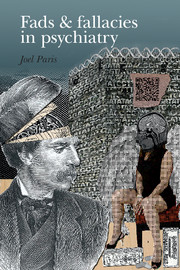4 - Aetiology
from Part II - Effects
Published online by Cambridge University Press: 01 January 2018
Summary
Psychiatrists may not like to admit it, but they do not always understand why their patients are sick. Actually, this problem is not unusual in medicine at large. Knowledge about the aetiology of disease, especially of chronic diseases, often lags behind treatment efficacy. Yet although psychiatrists spend much of their time managing patients with poorly understood illnesses, they still manage to help most patients who come their way. In some respects they are ahead of neurologists, who are sometimes seen as better at pinpointing lesions than doing something about them.
Even so, human nature being what it is, it is difficult to remain in a state of doubt. Even though fast responses often lead to wrong conclusions, our minds are programmed for closure (Kahnemann, 2011). Faced with suffering patients who can be desperate for help, physicians usually prefer confidence to uncertainty. This cognitive bias encourages pretensions to unrealistic and unreachable knowledge. We hold on to the illusion that we already understand the causes of mental illness, even when research is limited or absent.
Biological reductionism
The more a theory tries to explain everything, the more likely it is to be wrong. Psychoanalysis was a good example. It had an answer for everything, but accounted for nothing. Biological psychiatry has done much better, yet many of its ideas are oversimplistic and fallacious. This is due to the nature of the relationship between mind and brain. The scientific strategy of reductionism refers to a process in which complex phenomena are explained by mechanisms operating at a simpler level (Gold, 2009). Cutting things into component parts has been an essential and productive method in science and reductionism has been particularly successful in medicine. Little progress was made by past practitioners who did not understand how the human body was structured. While physicians are still taught to think of patients as a whole, research at the level of organs, tissues and cells is responsible for most of the progress in medicine over the past century.
- Type
- Chapter
- Information
- Fads and Fallacies in Psychiatry , pp. 37 - 44Publisher: Royal College of PsychiatristsPrint publication year: 2013



